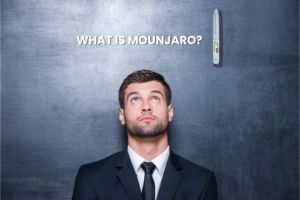Fasting during Ramadan presents unique challenges for individuals managing their weight loss journey with medications like Mounjaro (Tirzepatide). Whether you are already using Mounjaro or considering it for weight management, you may wonder how fasting impacts its effectiveness and safety.
This article explores the risks, benefits, and practical considerations of using Mounjaro while fasting during Ramadan.
What is Mounjaro and How Does It Work?
Mounjaro (Tirzepatide) is an MHRA-approved medication designed to help individuals with type 2 diabetes and those looking for effective weight loss solutions. It mimics two hormones—GLP-1 (Glucagon-Like Peptide-1) and GIP (Glucose-Dependent Insulinotropic Polypeptide)—that regulate blood sugar and appetite. Slowing gastric emptying and reducing hunger helps people lose weight more effectively.

Key Benefits of Mounjaro for Weight Loss
- Suppresses appetite
- Enhances insulin sensitivity
- Reduces cravings
- Promotes sustained weight loss
- Lowers blood sugar levels
Can You Take Mounjaro While Fasting During Ramadan?
You don’t have to worry about your fast when taking essential medications like weight loss injections. Islamic scholars and medical experts agree that necessary treatments, including Mounjaro and Wegovy, don’t break your fast as they fall under the same category as other vital medical treatments.
However, many people are still unsure about when to take their injections during Ramadan. The good news is that because these are weekly injections, they’re actually easier to manage than daily medications.

To avoid any potential side effects, such as nausea or stomach discomfort, you can schedule your injection during non-fasting hours—either after iftar (sunset meal) or before suhoor (pre-dawn meal). This way, you can stay on track with your treatment without disrupting your fast.
Mounjaro is typically administered once a week via subcutaneous injection. The primary concern for those fasting is how it interacts with prolonged periods of fasting and eating large meals during Iftar. Below are key aspects to consider:
Effects of Fasting on Blood Sugar Levels
Mounjaro works by keeping blood sugar stable, but during fasting, your body may react differently:
Risk of Hypoglycemia (Low Blood Sugar): If combined with other diabetes medications, fasting can lower glucose levels too much.
Digestive Side Effects: Mounjaro can cause nausea, bloating, and slow digestion, which may be aggravated by eating large meals at Iftar.
Dehydration Risks: Since Ramadan requires long fasting hours, Mounjaro’s appetite suppression may cause reduced thirst, leading to dehydration.
Who Should Avoid Using Mounjaro While Fasting?
While Mounjaro can be safely used in many cases, some individuals should take extra caution or avoid it altogether:
Those Prone to Gastrointestinal Issues: Mounjaro can slow digestion, making it difficult to handle large meals after fasting.
Pregnant or Nursing Women: The safety of Mounjaro during pregnancy and lactation is still being studied.
Individuals with Severe Dehydration Risks: If you experience frequent dizziness, weakness, or dehydration while fasting, Mounjaro might not be the best option.
Best Practices for Using Mounjaro During Ramadan
If you decide to continue using Mounjaro while fasting, consider the following tips to minimise risks and maximise effectiveness:
1. Adjust Your Injection Timing
The best time to take Mounjaro is at your suhoor, rather than after your iftar. This will help you feel full while the medicine is released throughout the day.
If you experience severe side effects, consult your healthcare provider to adjust your dosage or schedule.

2. Maintain Balanced Meals
Iftar: Start with light foods, such as dates, soup, and protein, before consuming complex carbohydrates and healthy fats.
Suhoor: Opt for high-fiber, high-protein meals to keep you fuller for longer.
Avoid Processed Sugars: Since Mounjaro affects glucose metabolism, steer clear of excessive sweets and refined carbs.
3. Stay Hydrated
- Drink plenty of water between Iftar and Suhoor.
- Incorporate hydrating foods like cucumbers, watermelon, and yogurt.
- Avoid excessive caffeine, as it can lead to dehydration.
4. Monitor Side Effects
If you feel weak, dizzy, or nauseous, adjust your meal plan. Consult your GP immediately, if symptoms become severe.
What Do Medical Experts Say?
Endocrinologists and diabetes specialists recommend that individuals on GLP-1 receptor agonists like Mounjaro discuss fasting with their clinician beforehand.
According to a study published in the Diabetes, Obesity & Metabolism Journal, Mounjaro is effective for weight loss but may require dosage adjustments during prolonged fasting.
Final Thoughts
Mounjaro can be safe and effective for weight loss during Ramadan, but only if used responsibly. If you choose to continue using it while fasting, ensure you:
- Take it at the right time (preferably at suhoor).
- Stay hydrated and eat balanced meals.
- Monitor side effects closely and consult a doctor if needed.
Fasting while on Mounjaro requires careful planning and medical guidance to ensure it remains safe and beneficial for your weight loss journey.
If you’re a patient with The Care Pharmacy, who is prescribed weight loss treatments, our clinicians are here to help. Feel free to email us at info@thecarepharmacy.com with any questions about managing your medication during Ramadan.
FAQs
Will fasting affect my weight loss progress with Mounjaro?
Yes, fasting may enhance weight loss due to caloric restriction, but it can also lead to muscle loss and dehydration if not managed properly.
Should I stop taking Mounjaro during Ramadan?
It depends on how well you tolerate it. If fasting makes you feel too weak, nauseous, or dehydrated, consider skipping Mounjaro during this period or adjusting your dosage under medical supervision.
Can Mounjaro help prevent overeating at Iftar?
Yes, since it suppresses appetite, it may help you control portion sizes, reducing the risk of post-fasting binge eating.
Is Mounjaro safe for diabetics who are fasting?
Diabetics should consult their doctor before fasting while on Mounjaro, as it may increase the risk of hypoglycemia or dehydration.
What are alternative weight loss strategies during Ramadan?
- Increase Protein Intake: Helps maintain muscle mass while fasting.
- Stay Hydrated: Essential for preventing weakness and dizziness.
- Exercise Smartly: Engage in light workouts after Iftar instead of intense activities.
- Mindful Eating: Avoid fried, sugary, and processed foods.
